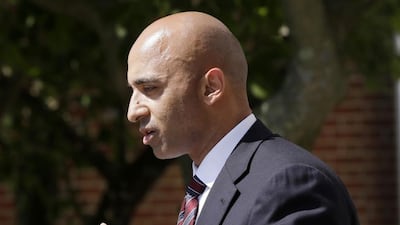Senior officials have denied a report in the Washington Post that alleges the UAE orchestrated a purported hack of Qatari state media that sparked the crisis between Doha and four Arab countries that accuse it of supporting extremism.
The Minister of State for Foreign Affairs Dr Anwar Gargash said on Monday that the report was "not true, purely not true."
“You will see in the next few days that the Washington Post story is going to die," he said at Chatham House in London.
Earlier in the day, the UAE ambassador to Washington, Yousef Al Otaiba, said the story is false.
"UAE had no role whatsoever in the alleged hacking described in the article,” he said in a statement.
“What is true is Qatar’s behaviour,” he added. “Funding, supporting, and enabling extremists from the Taliban to Hamas and Qaddafi…Inciting violence, encouraging radicalisation, and undermining the stability of its neighbours.”
Read more
> UAE calls for regional solution and international monitoring to resolve Qatar dispute
On May 24, two day after US president Donald Trump’s visit to Riyadh for a summit with leaders from the GCC and dozens of other Muslim-majority countries, Qatar News Agency carried on its website and a ticker on an online video incendiary quotes attributed to Sheikh Tamim, the emir of Qatar, including a denunciation of the summit and praise for Iran and Hamas.
The comments were then cited by Saudi Arabia, UAE, Bahrain and Egypt as the spark that reignited an even more serious diplomatic crisis than had previously occurred in 2014 over Doha’s support for Islamist groups across the region, and allegations that it funds terrorist groups in Libya, Syria and elsewhere.
Qatari officials have maintained that the quotes were part of an elaborate information warfare operation and have said they had tied parts of it to iPhones located in nearby countries, but never singled out a specific actor or nation.
Anonymous US intelligence officials reportedly told the Washington Post that “newly analyzed information gathered by US intelligence agencies confirmed that on May 23, senior members of the UAE government discussed the plan and its implementation”. The article stated that the officials were still not certain whether the hacks were carried out by contractors or officials.
Last month, Mr Al Otaiba’s emails were hacked and released by a group linked to Qatar called GlobalLeaks.
There has been much speculation about the Qatari claims of a hack that was behind Sheikh Tamim's statements being published. While previous reports have cited US officials claiming that Russian hackers were involved in the QNA incident, they were not explicitly tied to any of the four countries isolating Qatar.
The Washington Post story also comes days after the US secretary of state Rex Tillerson spent four days engaged in shuttle diplomacy between Kuwait, Qatar and Saudi Arabia — all strategic US partners — seeking to find a way to resolve the crisis. But his efforts, and those of European states, have so far been unsuccessful.

